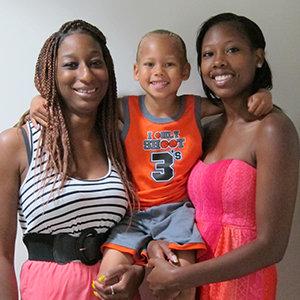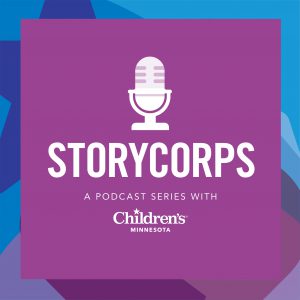Hemophilia: Christina and TaQuilla’s story


About this episode
Young mother, Christina, discusses her experience in raising her son- who is diagnosed with hemophilia. She relies greatly on her cousin, TaQuilla, her mother, and Children’s Hospital. She feels as though her son’s life is not limited by hemophilia, but rather enriched by it.
Topics:
- Diagnosis: Family history
- Support: Family
- Support: Children’s Minnesota
- Resilience: Future
- Treatment: Prophy
Transcript
Christina: My son has hemophilia, first at birth I really didn’t know that he had hemophilia, but as time went on I but as time went on I just had to learn how to deal with his hemophilia but dealing with hemophilia is not the easiest thing sometimes. The first day that I had him he had gotten his regular shots that they usually give them and he never stopped bleeding, so I think it was at birth that we knew to test him because I was a carrier. Within the three days that we were at the hospital we knew that he had hemophilia. I think I was more just scared because as a parent, I was 17 when I had him, so I think it was just more scary than anything to know that my kid had a life-threatening bleeding disorder that can affect him any time throughout his life. So it was scary at first, but knowing that I have a great team of people at the hospital, at Children’s. They just informed me that I didn’t have to be afraid of anything. If there was anything that I needed, that they were there. That’s how it’s always been. Yeah, my brother that’s four years older than me, Percy, he has hemophilia.
Susan (nurse): And what was it like when he was growing up? What did you notice about hemophilia as he grew?
Christina: I remember being in and out of the hospitals with him, or not being able to play with him too aggressive because he could easily hurt himself, can’t be roughhousing all the time. Over time, I just got used to it. Trying to explain it to other people boosted my confidence about it and made him feel better because he can explain to someone what it is and what it’s for.
Susan: Where did you find that strength to educate others about it?
Christina: I really didn’t have a choice; I just had to find it within myself and just know that it’s for his good to better him, and let people know what it is to live with a child that has hemophilia and that it isn’t easy.
TaQuilla: By him being just a boy, boys are rough. They want to do this and they want to jump and run and be just really aggressive. It’s really hard with Zarian with having hemophilia because there are certain things that we have to really watch him and let him know you can’t do that. I don’t really think he understands how it affects his body until after the fact that he’s done it.
Christina: I try to make sure I’m infusing him when I’m supposed to, other than if he goes away to his dad’s for the weekend. They don’t infuse him there, so he gets infused right before he leaves and then when he comes back. So usually he doesn’t have any bleeds on it.
Susan: At one point you helped us with a video on port access. What inspired you to be willing to do that?
Christina: He was really excited about knowing that he was going to be the kid chosen to be on video and he could be himself, which he was kind of goofy in the video. He helped me be more calm about doing it, and I knew that it would help other families. He can’t do a lot of things that other kids do, like in school they’re all outside and the teacher’s always just hovering over him like ‘you can’t do this, you can’t do that.’ I just let him know that anything you want to do, you do it. Just know that you have hemophilia so don’t be as rough as you can be.
Susan: As a parent, that’s scary, really feeling like you want to protect him but also let him learn and grow as a human being. Is it what you expected how things are going with him?
Christina: It’s actually not as bad now that he’s on prophy. It’s a lot easier to manage, because his bleeds won’t be as severe if he doesn’t have it. It stops the day, actually.
Susan: What tactics do you have for keeping him calm in those situations or to rest?
Christina: Electronics is the only thing that will help. If he’s down, you’re down. Don’t think that you’re going to do anything without him, so as long as you’re there with him watching TV or on the tablet, cell phone, or whatever it may be, he’ll stay there, too.
TaQuilla: I just want him never to feel like he can’t do anything because of this. We understand yes, it’s hard. Hemophilia is hard to deal with, but I don’t ever want him to feel like he can’t do anything because of hemophilia. Just a normal life all together is what I want.
Christina: Nurses that have always taken care of him have been very supportive and helpful in any way that they possibly could. That made me want to pursue my career, not just be a CNA but go back so I can work in hospitals.
Susan: Do you have any advice you’d give to another young mom raising a child with hemophilia?
Christina: Just to know that they’re not alone. There are always people that are willing to help them, whether it’s other parents that have been through it. Like for young moms, they have the moms group and the moms there are always trying to convince you the same thing; you’re not alone. There is someone in your corner. For sure, the hospital’s always in your corner. I’m sure there’s an answer for everything. Just listening to their stories about what they’ve been through with their kids. It gives you confidence to know that your kid, most kids, will make it through whatever it may be. I would just want him to know that I love him and I’ve done everything that I could to help him be a strong young man, and that I love him.
TaQuilla: Growing up with Zarian and having to bring him to the hospital before Christy was able to infuse him herself, it was very frustrating.. There are a lot of hospitals that are slightly uneducated when it comes to hemophilia, so anytime that you need help, I would suggest coming to Children’s to avoid any of that, because it was rough for us watching it.
Susan: But it’s really been a privilege. I’ve learned a lot from both of you and I am constantly amazed, MOM, by your strength. You’ve done this with the support of your family but a lot on your own. You’re 22. I don’t think I had the coping skills to do what you’ve done at the age of 22. I really care about little boys with hemophilia and their growing up. I want them to be resilient, really have a sense of themselves, and like you were saying be strong young men, who are able to manage or incorporate their diagnosis into their whole being so that it isn’t something that’s preventing them from taking chances in life and reaching for the things they want.
Christina: my biggest support has been my family as far as my mom and my cousin, TaQuilla, because those two are the only two that actually know what I go through because they live with both myself and Zarian. They see what I go through with him so they’ve just been very supportive. If I need help or if I feel like I’m getting a little upset, they’ll come and step in and they know what to do or they know how to soothe him. The second biggest support has been Children’s Hospital because whatever you need help with, they’re there.
TaQuilla: I just want him to know that the sky is the limit and hemophilia can’t actually stop you from doing anything in life.
We wish to extend our thanks to the families who have shared their story here about the impact of living with hemophilia and sickle cell disease. We would also like to thank the many who worked on this project:
The Children’s Minnesota StoryCorps Legacy Team:
Eddie Gonzalez, Jocelyn Bessette Gorlin, Susan Kearney, Stephen Nelson, Margaret Heisel-Kurth, Stephanie Davis, Angela Blue, Elizabeth McDonough, Jill Swenson and Alisa Linne.
Special thanks to:
Stephanie Moua, Hamdi Hussein, Sadia Farah, Fatima Ali, Caillyn Costello, Suzanne Lehman, Suzan Ulrich, D'Ann Urbaniak Lesch, Justin Nelson, Allison Albright, Marvin Holmes-Leopold, Jose Rodriguez and Mitch Hare.
Minneapolis Institute for Production and Recording:
Jose Rodriguez and Mitch Hare.